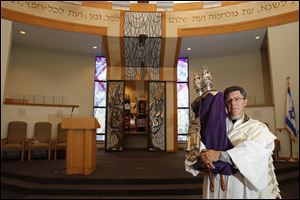
New cantor has variety of interests
Sylvania temple welcomes leader
9/24/2011
Cantor Ivor Lichterman of Congregation B'nai Israel came to Sylvania from Tucson. He is the son and the grandson of cantors.
Step inside the office of Cantor Ivor Lichterman and you'll see abundant signs of the cantor's wide-ranging interests.
There are photos of Cape Town, South Africa, where Congregation B'nai Israel's new worship leader was raised and went to college.
On one wall hang architecturally detailed pen-and-ink sketches of synagogues, drawn by Cantor Lichterman.
Propped against a bookcase are two poster-sized color photographs of synagogues taken by Cantor Lichterman that have been displayed in one of his art gallery exhibits.
A dozen or so models of famous Jewish temples are displayed in a bookcase.
Calligraphy, showing the words of a Jewish hymn and crafted by the cantor, adorns one wall.
There's a photo of Cantor Lichterman with jazz singer Al Jarreau.
A scale model of a 1965 Ford Mustang fastback is displayed inside a glass case, one of more than 1,000 model cars the cantor has built. "I'm a car nut. I love American muscle cars!" he said.
And everywhere there is music: vinyl LPs, turntables, recording equipment, cassette tapes, compact discs, sheet music, a keyboard, a trumpet.
A 1975 photo of his father, Cantor Jakub Lichterman, hangs prominently on a wall. He was a cantor at the second largest synagogue in Warsaw before World War II, and survived Brikenau, Auschwitz, and several other Nazi concentration camps. The elder Cantor Lichterman settled in South Africa after the war, where he served as a cantor until his death in 1986. Cantor Lichterman's mother, also a Holocaust survivor, still lives in Cape Town.
Growing up the son and grandson of cantors, Cantor Lichterman knew as a young child that he wanted to follow in their footsteps. He started working professionally as a cantor shortly after his bar mitzvah at age 13, filling in for Cape Town cantors who were traveling or ill.
He is also a certified mohel, having performed 750 ritual circumcisions to date.
As Rosh Hashanah, the Jewish new year marking the beginning of the High Holy Days, approaches -- it starts at sunset Wednesday -- Cantor Lichterman is looking forward to leading the music and worship at B'nai Israel, the Conservative Jewish synagogue on the campus of the Jewish Community Center in Sylvania.
He arrived in the Toledo area in August from Tucson, where he had been cantor of Anshei Israel Congregation for 20 years.
That congregation was dwindling and could no longer afford a cantor, he said. Before that, he had served 10 years at a synagogue in Stamford, Conn.
Cantor Lichterman said B'nai Israel seemed like a good fit for many reasons, including the fact that the congregation built a new synagogue in 2007, moving from Kenwood Boulevard to the JCC campus.
"If they just relocated four years ago, they have confidence in the future," he said.
He loves the synagogue's round sanctuary with its bimah, or platform, in the center instead of at the end, as in most temples. It not only provides "awesome" acoustics, he said, but leading worship from the middle of the congregation creates an intimate atmosphere for services.
Another reason for choosing B'nai Israel is that his son, Mayron, is a doctor in residence in Grand Blanc, Mich., just an 85-mile drive north of Sylvania. Cantor Lichterman and his wife, Jan, have two other children, a son who is a lawyer in New York City and a daughter in college in Arizona.
Cantor Lichterman said the High Holy Days are physically challenging but spiritually uplifting.
Rosh Hashanah, celebrating year No. 5772 on the Hebrew calendar, is followed by 10 Days of Awe that lead into Yom Kippur, or Day of Atonement, on Oct. 8.
It is a day of repentance and reflection, the cantor said.
"Yom Kippur, technically the end, the climax of our holidays, is a fast day," he said. "What does that mean? No water, no food. It ends up being about a 27-hour fast. … I'm singing all day and night. Go home, sleep, come back in the morning. I can't even have a cup of coffee, nothing," he said.
Abstaining from food and drink feeds the spirit, he said.
"It teaches you compassion for other human beings, compassion for society," Cantor Lichterman said. "We motivate ourselves to return to God in repentance."
Contact David Yonke at: dyonke@theblade.com or 419-724-6154.